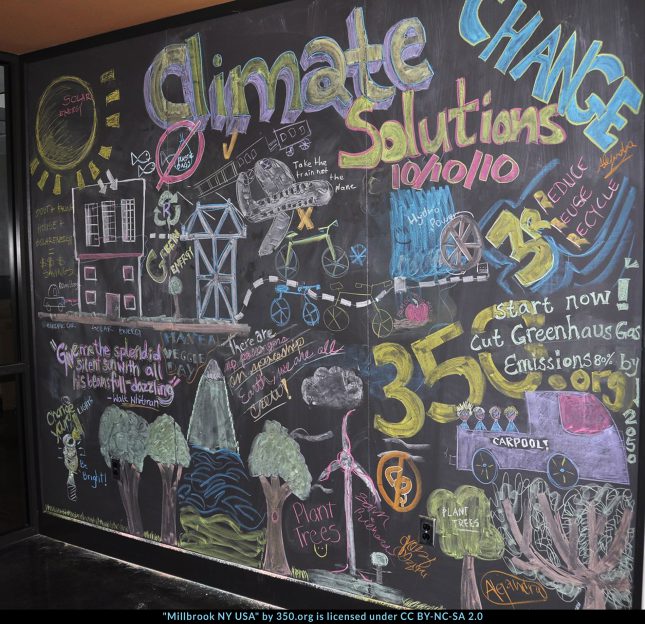UN climate discussions open in Bonn – Top climate actions for local government
November 11, 2017Written by Charley Beresford, Executive Director, Columbia Institute and co-author of Top Asks for Climate Action: Ramping Up Low Carbon Communities. Image courtesy of Kenneth Mankoff (CC BY-NC-SA 3.0) via Climate Visual Project.
(November 11, 2017) – From November 6 to 17, the world’s governments – now including Syria – are meeting in Bonn to continue work on the historic Paris Agreement. New reports tell us that the time for climate action is very short.
According to the United Nations Environment Program (UNEP), current global commitments are only one-third of what they must be to keep global warming below dangerous levels. Emissions must peak by 2020 and all countries will be called upon to take stock and deepen their commitments.
Canada, while providing a refreshing change in tone and a welcome activist role internationally, lags behind in greenhouse gas reduction commitments. Canada’s targets are insufficient to meet Paris goals. (To be on track, we need to bring emissions per person under two megatonnes. Right now, our footprint is over twenty megatonnes per person.)
Under the Paris Agreement, the opportunity to formally revisit this will come in 2020. In the meantime, there is much work to be done.
In Canada, enhancing the ability of local governments to act on greenhouse gas emissions is both a powerful opportunity and an absolute necessity for meeting our climate commitments.
Local governments, directly and indirectly, influence more than fifty percent of Canada’s greenhouse gas emissions, and they are taking climate leadership in communities across the country.
But they can’t do it alone. Federal and provincial/territorial governments are critical to ramping up local government action.
Having asked the question ‘what federal, provincial and territorial initiatives would boost local government climate initiative,’ the Columbia Institute’s Centre for Civic Governance released Top Asks for Climate Action: Ramping Up Low Carbon Communities, which laid out 18 federal policies and 24 provincial/territorial policies dedicated to leveraging up local government climate action.
Our 2017 Top Asks for Climate Action Federal Report Card took stock of these recommendations.
The federal government is off to a good start with a national price on carbon, funding for local government capacity building, a national transportation strategy and matching transit funding to local government priorities. In fact, 28% of our policy asks have been actioned and another 22% are in progress.
But we need to power up our efforts rapidly. The good news is that powering up low-carbon communities also means lots of jobs and the opportunity to address quality of life and equity issues.
So, where can the Federal government improve on initiatives that will enable local governments to realize their climate potential? Here are five key recommendations:
- Establish a mechanism that guarantees infrastructure spending won’t lock Canadians into a high carbon path;
- Move quickly on deep energy retrofits to achieve substantial market penetration in existing residential and commercial buildings;
- Provide all communities with energy, emissions and natural capital baseline data;
- Support energy democracy – promote people owned renewable energy generation and keep energy dollars circulating in Canadian communities; and
- Establish science-based targets to bridge the gap between Canada’s current greenhouse gas reduction targets and targets that are compatible with Paris Agreement goals.
Significant infrastructure spending has been allocated to address the enormous backlog built up across the country over previous decades. We can leverage this investment to accelerate Canada’s low-carbon transition by linking the spending to projects that will achieve low carbon results. Integrating infrastructure spending with climate goals begins with a GHG emissions profile for each project and inclusion of low-carbon criteria in project selection. That opportunity is here now, and it’s one of the fifty percent of federal climate asks that await implementation.
Giving local government the data they need to develop climate action plans and taking steps to encourage and support individual/aboriginal/ municipally owned renewable energy generation will speed up our low carbon transition and keep local dollars circulating.
Local government leadership has deep potential for meeting our climate change obligations. Let’s ramp it up.
